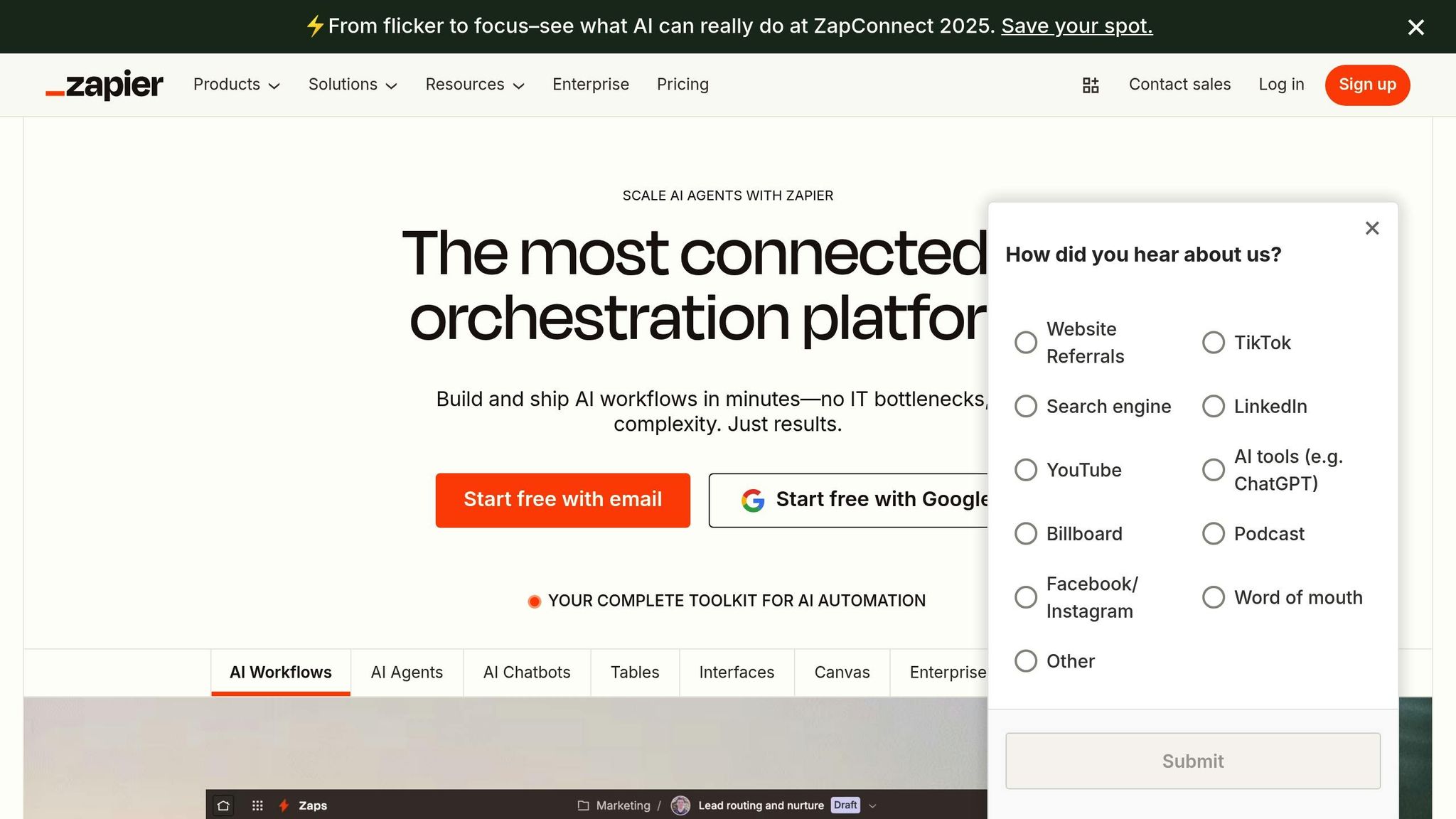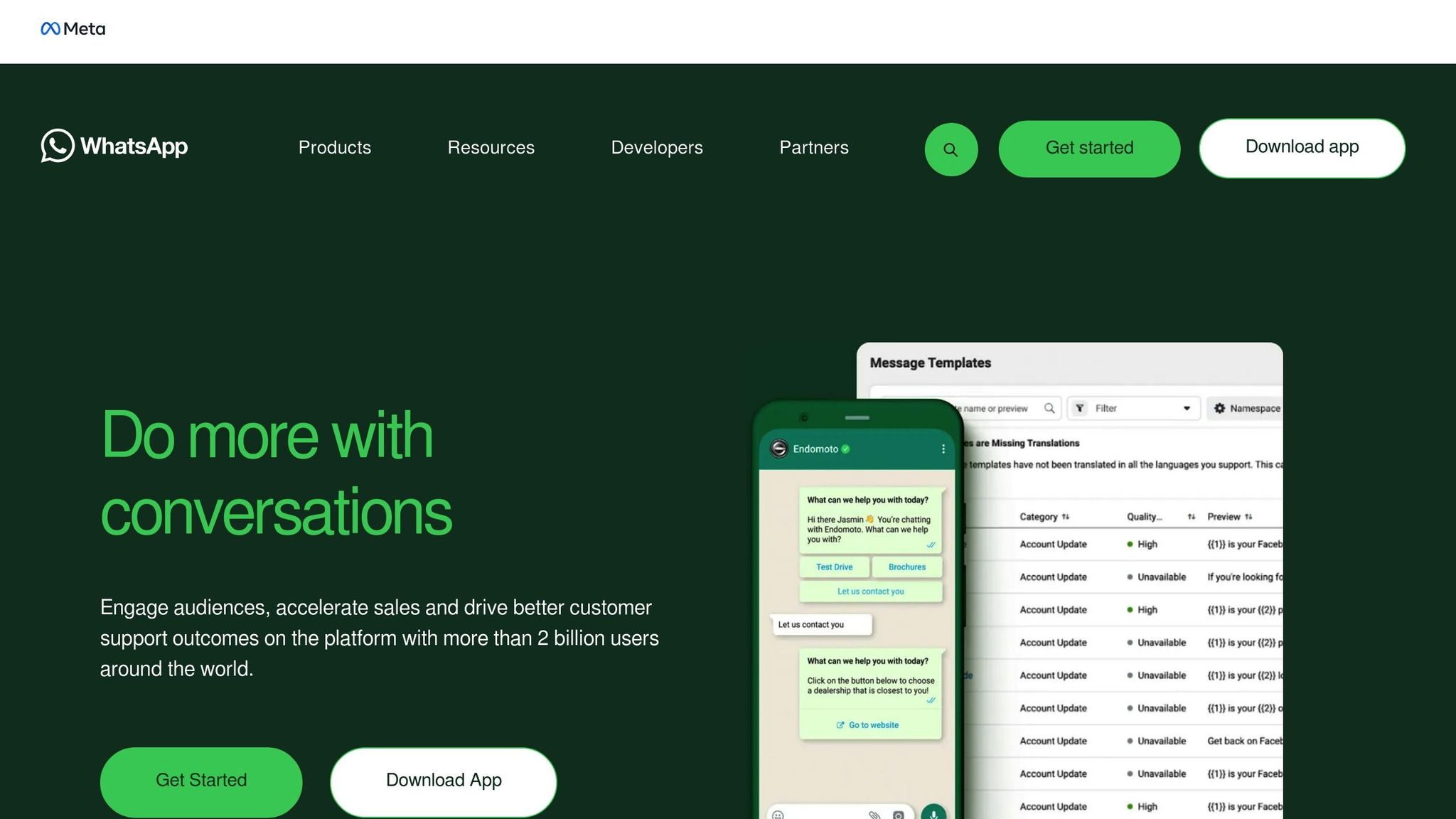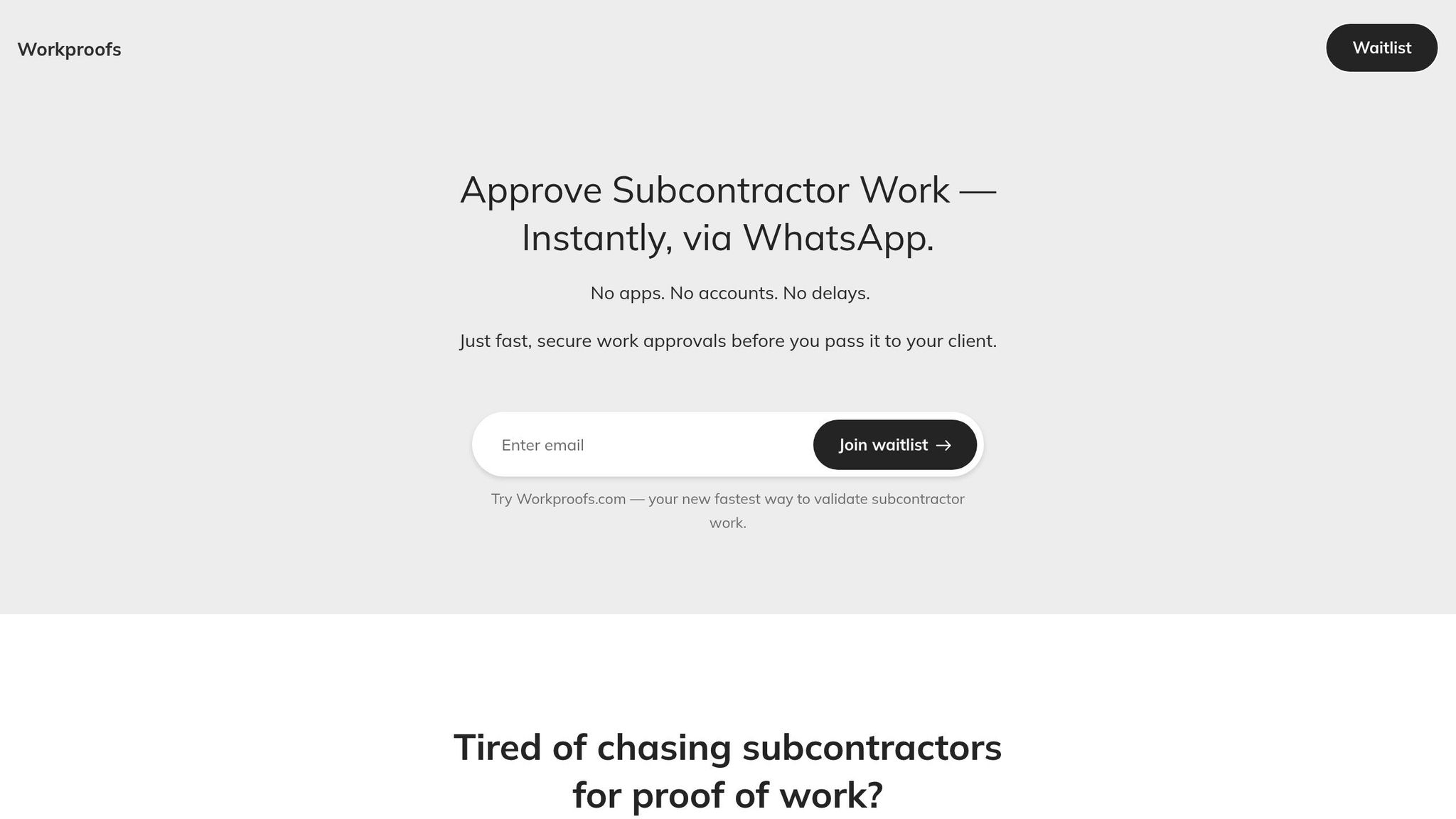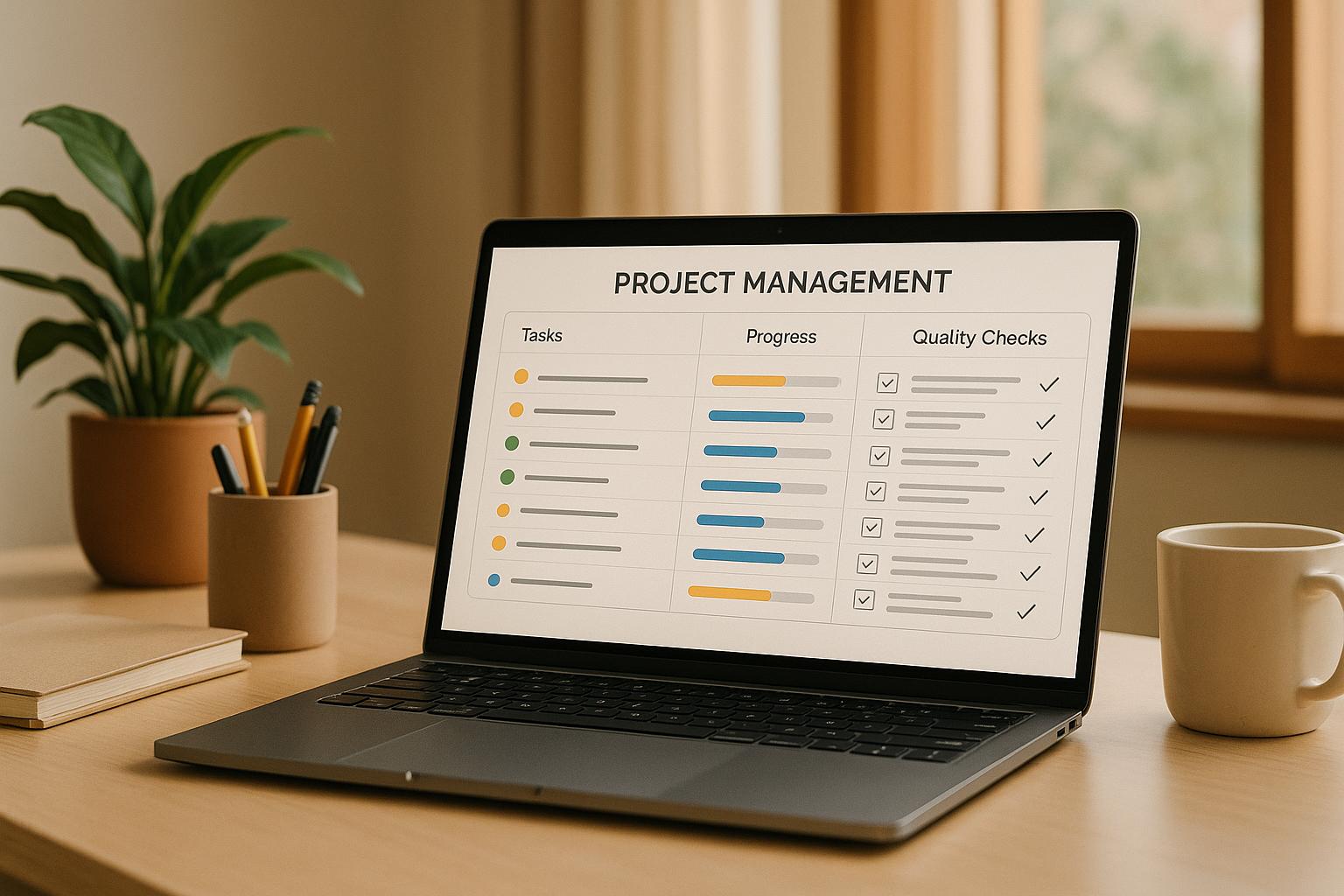Automated WhatsApp approval notifications make decision-making faster and more efficient for remote teams. By sending real-time alerts directly to WhatsApp, teams can approve tasks, review updates, and manage workflows on the go. With a 98% open rate and 80% of messages read within five minutes, WhatsApp ensures critical notifications are seen and acted upon promptly.
Key Benefits:
- Faster Decisions: Notifications reduce response times by up to 37%.
- Error Reduction: Automated workflows provide all necessary context, attachments, and deadlines.
- Scalability: Handles high volumes of requests across time zones without additional effort.
- Accountability: Tracks actions with a clear audit trail for transparency.
Setup Essentials:
- WhatsApp Business API Access: Required for automation, offering advanced features like chatbot workflows and multi-user support.
- Integration Tools: Connect with CRMs and workflow platforms for seamless operations.
- Compliance: Adhere to privacy laws (e.g., CCPA) by obtaining user consent and securing data.
Implementation Steps:
- Choose an automation platform compatible with your tools.
- Connect to the WhatsApp Business API through a verified provider.
- Design workflows with triggers and approval templates.
- Test thoroughly to ensure reliability and efficiency.
Automate WhatsApp Messages with AI: Zapier and WhatsApp Notifications Integrations

Requirements for Setting Up WhatsApp Approval Notifications
To establish automated approval notifications through WhatsApp, you'll need the right setup, tools, and adherence to compliance standards. These elements are the backbone of a reliable system that keeps your team operating smoothly.
WhatsApp Business Account and API Access
The first step is distinguishing between the WhatsApp Business App and the WhatsApp Business API. The Business App is great for small teams with basic needs, offering features like greeting messages, away messages, and quick replies. But if you're aiming for automated approval workflows, the WhatsApp Business API is the way to go.
The API is tailored for larger-scale operations, offering advanced capabilities like unlimited automated messaging, chatbot workflows, and integration with other business tools. Unlike the Business App, the API supports multiple users, making it ideal for streamlining approval notifications with timely, automated interactions.
To get started, you'll need to work with a WhatsApp Business Solution Provider (BSP) such as Interakt or Wati. The process involves several steps: registering your business with Meta Business Manager, verifying your business and phone number, and setting up your WhatsApp Business Account through your chosen BSP. Keep in mind that you'll need a phone number not tied to any existing WhatsApp account and the necessary business verification documents.
Pricing for the API is based on conversations, with charges determined by 24-hour sessions. Costs vary depending on factors like whether the message is initiated by the user or the business, the type of message (e.g., Marketing, Utility, Authentication, or Service), and the recipient's location.
Integration Tools and Workflow Platforms
The WhatsApp Business API doesn't function on its own - it requires integration with other tools to create efficient workflows. For example, CRM integration ensures personalized communication by providing access to customer data. This allows approval notifications to include relevant details, enabling team members to make well-informed decisions.
Several automation platforms work seamlessly with WhatsApp, offering features like no-code chatbots, message templates, and CRM integration. These platforms often include tools for automated messaging, analytics, contact management, and multi-user support.
When selecting integration tools, ensure compatibility with your existing systems like CRM software and project management platforms. This ensures that approval requests automatically include all necessary details - such as project information, deadlines, and attachments - without requiring manual input.
Investing in integration tools pays off quickly. Companies using WhatsApp for automation often see a 20–60% boost in conversion rates compared to email marketing. Additionally, automation can handle 70–80% of routine inquiries, freeing up your team for higher-value tasks. For approval workflows, this means faster responses and fewer delays in decision-making.
Compliance and Privacy Requirements
In the United States, setting up WhatsApp approval notifications requires strict adherence to data protection and privacy laws, such as the California Consumer Privacy Act (CCPA). Non-compliance with CCPA can result in penalties of up to $7,500 per intentional violation.
User consent is mandatory. Before sending messages on WhatsApp, you must obtain explicit opt-ins and offer clear, simple opt-out options. This involves implementing systems to track consent, manage user preferences, and handle opt-out requests automatically.
Transparency about data usage is equally crucial. Make sure your team and any subcontractors understand how their data is stored, used, and secured. This includes being clear about archiving practices, data retention policies, and access rights to approval communications.
Although WhatsApp uses end-to-end encryption, additional security measures are necessary to protect sensitive information. Secure archiving solutions and monitoring systems are essential for maintaining compliance. Regularly updating consent lists is also critical to reflect changes in user preferences or employment statuses. These efforts not only safeguard data but also ensure the reliability of your approval workflow.
| Compliance Feature | WhatsApp Business App | WhatsApp Business API |
|---|---|---|
| Automated consent management | ❌ | ✅ |
| GDPR/CCPA compliance tools | ❌ | ✅ |
| Data retention controls | ❌ | ✅ |
| User access rights management | ❌ | ✅ |
| Secure message archiving | ❌ | ✅ |
The WhatsApp Business API provides advanced compliance features, including automated consent management and robust data handling tools, which are absent in the basic Business App. Partnering with GDPR-compliant providers and training your team on proper data practices will further ensure your system meets all legal requirements.
How to Set Up WhatsApp Approval Notifications
Now that you’ve outlined your requirements, it’s time to dive into building your automated approval system. This setup involves three main steps: picking the right automation platform, connecting to the WhatsApp Business API, and designing workflows tailored to your team’s needs.
Selecting an Automation Platform
Start by choosing an automation platform that integrates seamlessly with your CRM, project management tools, and any other systems your team relies on. This ensures approval requests automatically include all relevant details - like project information, deadlines, and attachments - without the need for manual input.
Look for platforms with user-friendly drag-and-drop workflow builders. These tools make it easy for your team to tweak workflows without needing technical expertise.
If your team is growing or experiences seasonal changes, scalability becomes a key consideration. The platform should handle higher message volumes and manage multiple approval chains without a hitch. It should also adapt to temporary workforce expansions or project-based team changes.
Another must-have feature is message template management. This is crucial for staying compliant with WhatsApp’s Commerce and Business Policies. Your platform should allow you to create, submit, and track templates throughout the approval process.
Lastly, real-time monitoring and analytics are invaluable. They let you track approval response times, spot bottlenecks, and measure team performance. Look for detailed reports on metrics like message delivery rates, response times, and workflow completion.
Once you’ve selected your platform, the next step is connecting it to the WhatsApp Business API.
Connecting to the WhatsApp Business API

Here’s how to connect to the WhatsApp Business API:
- Prepare for the connection. Ensure your phone number isn’t linked to an existing WhatsApp account. If it is, you’ll need to disconnect it from the app since a number can’t be used for both personal WhatsApp and the Business API. Have your business verification documents ready, ensuring they match the details in your Meta Business Manager account to avoid delays.
- Follow the connection process. While steps may vary by platform, they generally follow a similar pattern. For example, using Albato, you’d log in, go to the Apps section, and select “Add a connection.” Choose WhatsApp Business API, name the connection, and grant access to your Facebook account. From there, you’ll create or select a Facebook Business Account and a WhatsApp Business Account, entering your company details, selecting a profile category, and providing a description.
- Verify your phone number. Enter your business phone number and confirm it via SMS or voice message. Once you receive the confirmation code, enter it to complete the process. Don’t forget to add a payment method within 1–2 hours to avoid service interruptions.
- Keep these considerations in mind. Once your number is linked to the WhatsApp Business API, you won’t be able to use it with the regular WhatsApp app or access previous chat history. This is a permanent change, so plan accordingly and communicate this to your team.
With the API connection in place, you’re ready to move on to building and testing approval workflows.
Creating and Testing Approval Workflows
Efficient workflows are the backbone of a smooth approval system, especially for remote teams. Here’s how you can set them up and refine them:
- Design your workflows. Map out your approval process step-by-step. Use a trigger-action model where specific events automatically initiate approval requests. For instance, when a subcontractor submits proof-of-work photos, the system should instantly send a WhatsApp notification to the relevant manager with project details and approval options.
-
Create message templates. These templates are essential for WhatsApp approval notifications. Submit them for WhatsApp’s approval, as they are required for first-time contact. Ensure templates are formatted correctly with variables like
{{1}}and{{2}}and comply with WhatsApp’s policies. - Monitor the template approval process. Use WhatsApp Manager to submit templates and track their status. Be aware that templates can be paused or disabled based on customer feedback or policy violations. Notifications, emails, and webhooks can help you stay on top of template status.
- Test your workflows. Simulate triggers to confirm workflows activate as expected. Check that messages are sent promptly, include accurate details, and that approval responses update project statuses correctly. Test for scenarios like network issues, delayed responses, or incorrect approvals to ensure the system handles them gracefully.
- Run a pilot test. Before a full rollout, test the system with a small group of managers and subcontractors. Gather feedback on response times, user experience, and any technical hiccups.
- Refine based on feedback. Use insights from testing to make adjustments. This might involve tweaking message timing, simplifying approval options, or adding more project context to notifications. The goal is to create a system that boosts productivity without complicating workflows.
| Testing Phase | Focus Area | Success Metrics |
|---|---|---|
| Trigger Testing | Workflow activation | 100% trigger response rate |
| Message Delivery | Template functionality | 98% delivery rate within 30 seconds |
| Response Processing | Approval handling | Accurate status updates in under 60 seconds |
| Failure Recovery | Error handling | Clear notifications and graceful recovery |
| Pilot Testing | Real-world usage | Positive feedback and improved efficiency |
Thorough testing ensures your workflows are reliable, efficient, and compliant with WhatsApp’s guidelines, setting the stage for a smooth approval process tailored to your team’s needs.
Best Practices for Approval Automation
Once you've established your automated approval system, following a few essential practices can help maintain its efficiency and safeguard sensitive data. These tips will help you fine-tune notifications and ensure your remote team operates smoothly.
Managing Notification Frequency
The key to effective approval automation lies in striking the right balance - keeping your team informed without overwhelming them with notifications. Too many alerts can lead to missed approvals and reduced productivity.
Start by categorizing notifications based on urgency and importance. For example, critical tasks like safety inspections or client-facing deliverables should trigger immediate notifications. On the other hand, routine updates can be grouped into scheduled summaries. As Malcolm Teas, an experienced software engineer, explains:
"The purpose of a push notification is to tell the user there's something important for them to use the app for." – Malcolm Teas, Experienced software engineer & manager
When working with a distributed team, time zone awareness is crucial. Studies show that businesses using scheduled messaging see a 32% increase in conversion rates, with messages sent between 8:00 PM and midnight achieving 20% higher engagement rates. To avoid disrupting team members during their off-hours, configure quiet-hour settings tailored to their local time zones. For instance, if your project manager is in New York and your subcontractor is in Manila, avoid sending non-urgent notifications during their respective evenings.
Personalized notifications can increase engagement by 41%. Include specific details like project names, deadlines, and context. For example, a notification might read: "Bathroom renovation photos from Site #47 ready for approval – Due: 3:00 PM EST today."
Experiment with different notification frequencies to find the best fit for your team. Some managers may prefer immediate alerts for every task, while others might work better with consolidated updates. Always prioritize high-priority alerts for urgent situations like safety issues or client emergencies. Remember:
"When everything is important, nothing is important."
Lastly, ensure that notifications are not only timely but also secure, as they often contain sensitive information.
Protecting Data Security and Privacy
While WhatsApp's end-to-end encryption provides a strong foundation, additional security measures are essential when handling sensitive approvals.
Enable two-step verification for all WhatsApp Business accounts to prevent unauthorized access. With over 2.78 billion active WhatsApp users expected globally by 2025, it’s a platform that naturally attracts security threats.
Adjust privacy settings to limit visibility to unknown contacts and prevent impersonation attempts. Turning on security notifications for encryption alerts can help detect potential interception during approval exchanges.
Remote work introduces additional risks. Nearly 40% of employees access corporate data on personal devices, and 70% use work devices for personal tasks. Alarmingly, about 30% admit to sharing work devices with others. To mitigate these risks, implement multi-factor authentication (MFA) across all connected systems. Weak passwords are a leading cause of data breaches, contributing to over 80% of security incidents.
For sensitive approvals, consider using features like disappearing messages or view-once media to ensure information isn’t stored indefinitely on devices. Additionally, encrypt WhatsApp backups and train your team to recognize and avoid suspicious links.
Monitoring and Improving Performance
Optimizing notifications is just one piece of the puzzle. To sustain efficiency, you need to track performance metrics that directly impact productivity and client satisfaction.
Monitor response times and handling efficiency. Businesses that respond first capture 35–50% of sales, with ideal resolution times under 8.30 minutes. Break down your data by factors like time of day or approval type to identify trends and bottlenecks. Define what a successful approval cycle looks like - such as moving a request from "submitted" to "approved" within a specific timeframe.
Keep an eye on message open rates. WhatsApp boasts a global open rate of about 98%. If your notifications aren’t achieving similar engagement, reassess their timing, content, or delivery method.
Real-world examples highlight the potential of these strategies. For instance, Expert, a company based in the Netherlands, achieved an 80% conversion rate using WhatsApp. Similarly, Matahari, a department store, improved conversion rates by 2.5 times across more than 15 million messages.
Set up automated alerts to notify you when key metrics fall below acceptable thresholds. Segment your data by agent, day, or approval type to identify opportunities for improvement. Regular performance reviews, such as monthly check-ins, can help you analyze trends and gather feedback for continuous refinement.
As Hania Elmessiry, a content writer, puts it:
"You need these metrics to know whether your strategies are working and what needs improving."
sbb-itb-57e8e01
Case Study: Subcontractor Approvals with Workproofs.com

Workproofs.com has made subcontractor approvals in the U.S. simpler and faster by leveraging WhatsApp. This tool allows subcontractors to submit proof of work directly through WhatsApp, eliminating the need for extra logins or complicated systems. Managers, in turn, can approve submissions with a single tap, and all records are automatically saved. This case study highlights how these streamlined workflows translate into measurable benefits.
How Workproofs.com Operates
The process is straightforward. When a subcontractor finishes a task, they can send a photo, file, or text proof through WhatsApp. Managers then review the submission and either approve it or request changes - all within the same conversation. As Workproofs.com puts it:
"Workproofs.com makes it simple: subcontractors send proofs, you approve or reject - all within WhatsApp."
This streamlined approach is especially useful for teams with frequent staff changes or those who may not be tech-savvy.
Benefits for U.S.-Based Teams
Workproofs.com’s design offers clear advantages for teams. Digital workflows cut management time by up to 70%. Consider this: the average worker spends about 13 hours a week on emails and similar communications - nearly 28% of their workweek. By consolidating approvals into WhatsApp, much of this time can be reclaimed.
The platform also boosts accuracy and accountability. Creative directors, for example, can quickly approve deliverables, allowing 75% of team members to focus on their core tasks - creating content. Additionally, timestamped records ensure clear documentation of completed and approved tasks, reducing misunderstandings and keeping everyone on the same page.
Another key feature is mobile approval. In today’s world, managers expect to handle tasks on the go, and Workproofs.com delivers. Approvals can be managed from anywhere, freeing managers from their desks. This flexibility improves response times, boosts team morale, and lowers administrative overhead, leading to cost savings. These benefits align with the broader advantages of automated WhatsApp notifications, as previously discussed.
Conclusion: WhatsApp Approval Automation
For remote teams in the US, WhatsApp approval automation has become a game-changer, helping streamline operations and maintain accountability. By providing real-time, trackable mobile notifications, it simplifies project management and ensures that tasks keep moving without unnecessary delays.
To get started, teams need a few key components: access to the WhatsApp Business API through an authorized provider, workflow automation tools like Zapier or Integromat, and integration with existing CRMs or project management systems. While setting up these systems requires an upfront investment, the payoff comes in the form of greater efficiency and reduced administrative tasks.
The results speak for themselves. Companies using WhatsApp automation have reported a 30% boost in customer satisfaction and a 40% drop in inbound inquiries. For approval workflows, the ability to instantly process notifications and maintain timestamped records eliminates bottlenecks that can slow down projects.
Take Workproofs.com as a real-world example. Designed for US teams managing subcontractors and remote workers, it replaces complicated apps and lengthy training processes with a simple, intuitive system. Focused on proof-of-work submissions and single-tap approvals via WhatsApp, the platform ensures a seamless experience for both managers and field workers, even in high-turnover industries.
Of course, privacy and compliance remain critical. US companies must prioritize adherence to CCPA, secure explicit user opt-ins, and follow WhatsApp's messaging guidelines to protect data and maintain trust. Addressing these concerns early on helps avoid penalties and fosters confidence among users.
Looking ahead, the next wave of approval automation will likely involve AI-powered chatbots and smarter workflow triggers capable of handling routine decisions automatically. As remote work continues to evolve, WhatsApp approval automation will play an even larger role in enhancing efficiency, accountability, and responsiveness for US teams. By embracing this technology, remote teams can make faster decisions, improve accountability, and simplify their workflows.
FAQs
What’s the difference between the WhatsApp Business App and the WhatsApp Business API for sending approval notifications?
The WhatsApp Business App is a free and straightforward tool tailored for small businesses looking to handle customer communication efficiently. With features like quick replies, labels to organize chats, and product catalogs, it’s a great choice for businesses with basic messaging needs.
On the other hand, the WhatsApp Business API is designed for larger businesses or teams that need more advanced functionality. It enables automation, integrates seamlessly with CRMs, and supports multi-agent access for customer service teams. The API also allows for automated approval notifications and other advanced workflows, but setting it up requires prior approval from WhatsApp.
To sum it up, the app is ideal for small businesses with simple needs, while the API is built for companies aiming to scale and automate their communication processes.
How can businesses ensure compliance with privacy laws like CCPA when using WhatsApp for automated approval notifications?
To comply with privacy laws like the California Consumer Privacy Act (CCPA) when using WhatsApp for automated approval notifications, businesses need to follow a few key steps:
- Get user consent: Make sure all users - whether they’re employees, subcontractors, or managers - understand how their data will be used and explicitly agree to it.
- Limit data collection: Collect only the information absolutely necessary for the approval workflows. This reduces exposure to privacy risks.
- Ensure secure communication: WhatsApp’s default end-to-end encryption helps protect sensitive data during transmission, but it’s important to verify that this feature is active.
It’s also a good idea to regularly review your processes to stay in line with changing privacy laws. Consulting a legal expert who understands the CCPA and similar regulations can provide additional peace of mind.
How can I set up WhatsApp approval notifications to work with my existing CRM or workflow tools?
Setting Up WhatsApp Approval Notifications with Your CRM
To get started with WhatsApp approval notifications, the first step is to confirm that your CRM supports WhatsApp integration. Most platforms enable this through the WhatsApp Business API. You'll need to secure API access, which is typically provided by Meta or an authorized service provider, and then configure it within your CRM system.
After the integration is set up, you can create automated workflows or triggers in your CRM to send approval notifications directly via WhatsApp. For instance, you could configure it so that managers receive instant notifications when a task is completed or requires their review. This type of automation helps streamline communication, cuts down on delays, and keeps your team accountable.


